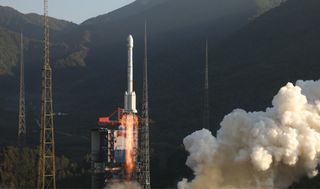China's space agency launched two new navigation satellites into orbit Saturday (Nov. 23), a successful mission that also appeared to send booster segments crashing into a settlement back on Earth.
A Long March 3B rocket launched two Beidou navigation satellites for China's constellation from the Xichang Satellite Launching Center in the country's Sichuan Province at 8:55 a.m. Beijing Time Saturday (1255 GMT or 7:55 p.m. EST on Nov. 22). The rocket was equipped with a Yuanzheng-1 (Exploration-1) upper stage to help deliver the satellites to their final orbit.
While the Long March 3B rocket successfully delivered its satellite payload to orbit, boosters from the three-stage rocket appear to have crashed into a settlement downrange from the Xichang launch site, according to video and pictures shared on China's Wiebo social media service and reposted on Twitter. The images show show buildings on fire and damaged, apparently by debris from the Long March 3B, which can be strewn across the area.
Video: Watch China's Launch March 3B Rocket Launch
This is the aftermath downrange following a Chinese Long March 3B launch from Xichang early Saturday. And that yellow smoke is very toxic hypergolic propellant. Source: https://t.co/VEh5X8Ors0 pic.twitter.com/22IVIpyJOkNovember 23, 2019
While it may seem surprising, the scene is can be a familiar one for Chinese residents living downrange of the Xichang launch site.
China's first three launch sites were built deep inland, meaning that their boosters drop segments and stages over land, rather than out to sea, said Andrew Jones, a space journalist who specializes in China's space program and shared the Weibo images on Twitter. (Jones is also a contributing writer to Space.com).
Images from the booster crash site.ℹ:https://t.co/vY0CEN4CFY pic.twitter.com/u2eCbNDEgnNovember 23, 2019
"In particular, launches from Xichang, situated in Sichuan province in the southwest, seem to threaten populated areas downrange," Jones told Space.com in an email. "The launch profile of Long March 3B rockets, especially those with a payload of a pair of Beidou navigation satellites, has resulted in near misses and impacts on settlements."

China has been ramping up its space launches in recent years, so impacts near or in towns are occurring more often, he added. The two Beidou satellites launched Saturday are the 50th and 51st of their kind and part of the Beidou-3 system, according to China's state-run Xinhua news service. They serve as a global positioning satellite network for China, which aims to complete the current Beidou constellation by mid-2020, Jones said.
"The residents within the calculated drop zones for spent stages and boosters are warned and these areas are, apparently, evacuated — the fact that we often see amateur footage of boosters falling from the sky supports the notion that they are warned and expecting to see a falling spent rocket stage," he added.
According to Jones, the warnings sent to residents in a rocket drop zone include key safety instructions.
"The notice instructs people to go to a safe zone ahead of launch, and not to approach wreckage if they find it, due to the harmful effects of the residual propellant," he said.
Email Tariq Malik at tmalik@space.com or follow him @tariqjmalik. Follow us on Twitter @Spacedotcom and on Facebook.

"space" - Google News
November 23, 2019 at 11:04PM
https://ift.tt/2pKqXyJ
Chinese Rocket Launches 2 Satellites (and Drops Debris on Settlement) - Space.com
"space" - Google News
https://ift.tt/2Q8TIzF
Shoes Man Tutorial
Pos News Update
Meme Update
Korean Entertainment News
Japan News Update
Bagikan Berita Ini














0 Response to "Chinese Rocket Launches 2 Satellites (and Drops Debris on Settlement) - Space.com"
Post a Comment